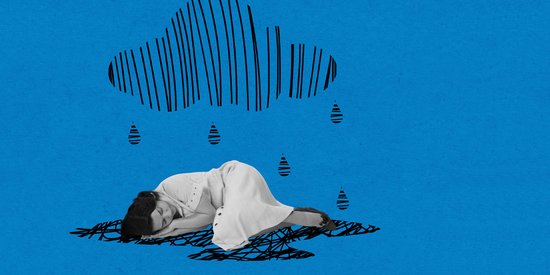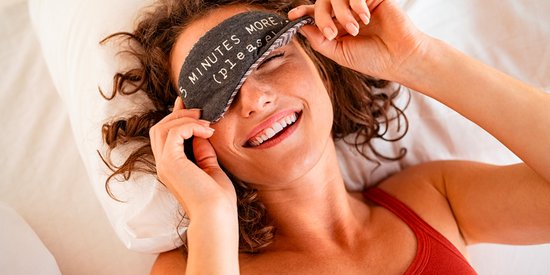Do you dream of sleeping like a baby? I really understand you, since it is not everyone who has the chance to join the arms of Morpheus as soon as their head rests on their pillow.
We spend a third of our life sleeping and having good sleep is part of the rites of a healthy lifestyle. Faced with the rhythms of daily stress and the ultimatums of the modern world, our sleep can very quickly become disturbed. Our biological clock ets upset, which causes mood swings, risks of cardiovascular disease, high blood pressure, gastrointestinal disorders, viral infections, depression, headaches...
Here are 10 good habits to adopt to regulate your sleep.
Sleep at regular times
Between night owls and early birds, it is very obvious that the phases of when you fall asleep can vary according to your habits. You should change them if you want to stay healthy... Yes, sleep is the key to our health. Our body is like a clock and to function properly it needs a regular cycle. It is therefore better to go to bed at a fixed time both during the week and on the weekends, if that is possible. Our sleep needs vary from one individual to another, but it is still advisable to sleep at least between 7 and 8 hours a night. You will have to start by determining your need for the amount of hours of sleep you need to be in good shape, because sleeping well can be learnt.
The more we illuminate our lives, the less we sleep.
Much more than noise, lights interfere with our sleeping phase. The pineal gland works only in the absence of light, and the function of our brain is to secrete melatonin. Light affects our circadian rhythms more than anything else. Several studies have shown that a simple night light keeps our brain alert like a powerful synchronizer, that constantly resets our internal clock to the 24-hour cycle. Sleep needs protection to settle down and the arrival of screens, smartphones, tablets and computers that have invaded our bedrooms, has amplified the problems of insomnia.
Result: whether natural or artificial, light plays an essential role in the biological clock, thus becoming the main enemy of sleep.
Dare to rest!
One nap or several naps during the day will in no way be able to make up for lack of sleep. So, then, is it actually recommended to take a nap during the day? After a chaotic night, we can often have the desire to find ourself in the arms of Morpheus. Several studies in this direction show how a daily nap of 10 to 90 minutes depending on our age, rebalances the body dramatically. If you feel the need to lie down during the day and you have the possibility, give preference to micro-naps of 10 to 90 minutes, because they promote recovery on many points. To avoid prolonging them, opt for an alarm clock. Napping is encouraged by many sleep specialists, keeping in mind not to confuse fatigue with the need for sleep. We will see together how some simple habits can be enough to improve the quality of your sleep.
Insomnia: should you stay lying down or just get up?
This is a long-awaited question…. Insomnia is a nightmare for many people. If you're constantly waking up in the middle of the night and having trouble getting back to sleep get up, go to another room and occupy your mind with some quiet activity until sleep comes to you. Possibly opt for reading, relaxation, or meditation. Sleep specialists advise not to insist upon any of these. Of course though, we don't turn on the TV or our mobile phone!
Stop looking at the clock at night
Stress and the anxiety of passing time, our first instinct is, of course, to look at the clock to see what time it is, right? Know that when you look at the time in the middle of the night, your brain can't help but count the number of hours you have left to sleep, or those you have already slept. As a result, it governs stress, the anxiety of passing time, which in turn promotes insomnia.
More coffee?
The great paradox or even a vicious circle: When a person sleeps poorly at night and suffers from recurrent insomnia, the first reflex in the morning and for many throughout the day is to consume caffeine. Caffeine begins to act on average 15 to 30 minutes after its absorption and its effect lasts for 3 to 6 hours, needless to say, coffee after the evening meal will be your worst enemy. Try to moderate your doses of caffeine, theine, energy drinks and all other stimulants. Get used to taking infusions of soothing plants and despite popular belief, milk contains tryptophan, an amino acid that promotes sleep.
The atmosphere of your room- Feng shui version
Could the quality of your sleep could also depend on the color of your bedroom? Some people will opt to change their bedding or change their pillow. As for others, they will opt for pastel colors, while ensuring the layout of their bed between the dilemma of the head placed towards the east or the west. Whether you adopt a decoration inspired by Feng Shui or not, the ideal for a bedroom is to be tidy and to have a refined kind of style. To sleep well, it is therefore preferable to create a calm and serene space.
Take care of your eating habits
Your dinner affects the quality of your sleep. It is therefore desirable to avoid large, fatty and protein-rich meals to prevent digestion from interfering with your sleep. You can opt for vegetarian-type meals that have proven effects on sleep. The mechanisms of digestion and and sleep come into competition very quickly, so it is desirable to have a meal made up of legumes (lentils, dried beans, chickpeas, etc.) or a soy-based product (beef steak). soy, tofu), combined with vegetables and a cereal product, preferably wholewheat or semi wholewheat, which is optimal for preparing for sleep. And if you are not a big fan of a vegetarian menu, choose foods rich in tryptophan in the evening, an amino acid necessary for the synthesis of serotonin. Read more also about foods that help you sleep.
A hot shower or bath before going to bed
According to a study published in the journal Sleep Medicine Reviews, taking a hot shower or bath one to two hours before bedtime, significantly improves sleep. The recognized effectiveness of a prolonged hot bath (more than 30 minutes at 40-43°C) stimulates the body's thermoregulation system, thus promoting the acceleration of the sleeping phase.
Good bedding is the basis of good sleep
If we start from the fact that we spend a third of our life in our bed, it is very obvious that the choice of comfortable and appropriate bedding is just as essential for good sleep. A good mattress and a good box spring are the support elements for a good sleep and a good night's sleep. Bedding does not last forever and sometimes you have to think about changing it, as much for more comfort as for improving your sleep. It has been observed that the quality of sleep deteriorates when the mattress is more than 7 years old.
Difficulty getting to sleep is an increasingly common problem. The sleep market is booming, as evidenced by the interest of start-ups competing for ideas to develop new innovations. Beware of the dream seller, keep in mind that insomnia is often temporary and is often due to bad habits. To find serene nights, all you have to do is slightly modify your lifestyle. Some sleep specialists offer a follow-up program with personalized advice adapted to your daily life. Technological advances will not stop surprising us, indeed thanks to digital trends, it is possible to download mobile applications designed to help you regain and maintain quality sleep.









